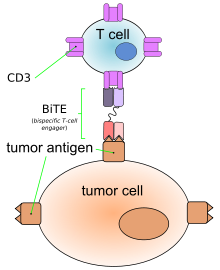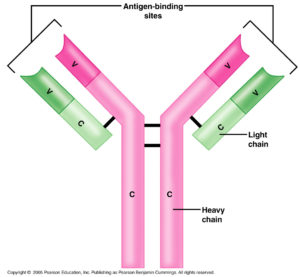Bispecific antibodies are bioengineered proteins that can simultaneously bind to two different types of antigen (such as found on cancer cells). Bispecific antibodies appear to be destined to play an important role in immunotherapy-based cancer therapy together with checkpoint inhibitors, CAR-T cell therapy, and other types of immunotherapy. Cancer immunotherapy improves the functioning of the immune system to better seek out and destroy cancer cells. Research has uncovered ways to modify immune cells in ways to improve their functioning.
Bispecific antibodies have an advantage over other immunotherapies since they can bring cancer cells and immune cells in closer proximity, allowing immune cells greater opportunity to kill cancer cells. Bispecific antibodies can bind to antigens that are expressed relatively weakly, making them more toxic to cancer cells than other immunotherapies. Also, bispecific antibodies can be mass produced in advance, while CAR-T cells, for example, must be prepared for each cancer patient.
The basic structure of all antibody molecules consists of four protein chains shaped like a capital letter Y. Two chains are longer and are designated “heavy,” while the other two chains are shorter and designated “light.” Antigen-binding sites are located on the outward tips of the four protein chains. Different regions of the antibody, designated “Fc” and “Fab,” can also serve as binding sites. These regions have significance in the development of bispecific antibodies.
Public Domain (work of the US Government-May 6, 2007)
The bispecific antibody, blinatumomab, was approved by the FDA in 2017 for the treatment of acute lymphoblastic anemia. Another bispecific antibody, catumaxomab, has orphan drug status from the FDA for gastric and ovarian cancers. However, this drug is no longer produced by the manufacturer. Clinical trials are currently underway, studying over fifty bispecific antibodies for various malignancies.
References
- Clift,I, “Bispecific, Multispecific Antibodies Grapple with Cancer,” Genetic Engineering & Biotechnology News. Feb. 7, 2019. https://www.genengnews.com/insights/bispecific-multispecific-antibodies-grapple-with-cancer/
- Jenks, Susan. “Bispecific Antibodies in Cancer.” Cancer Therapy Advisor. Aug. 22,2018. https://www.cancertherapyadvisor.com/home/cancer-topics/general-oncology/bispecific-antibodies-in-cancer/
- Kaiser, Jocelyn. “Designer antibodies fight cancer by tethering immune cells to tumor cells.” Science. May 28, 2020. https://www.sciencemag.org/news/2020/05/designer-antibodies-fight-cancer-tethering-immune-cells-tumor-cells
- Runcie, K., et al. “Bi-specific and tri-specific antibodies- the next big thing in solid tumor therapeutics.” Molecular Medicine. (2018) 24:50 https://pubmed.ncbi.nlm.nih.gov/30249178/
- “Bispecific monoclonal antibody.” https://en.wikipedia.org/wiki/Bispecific_monoclonal_antibody

